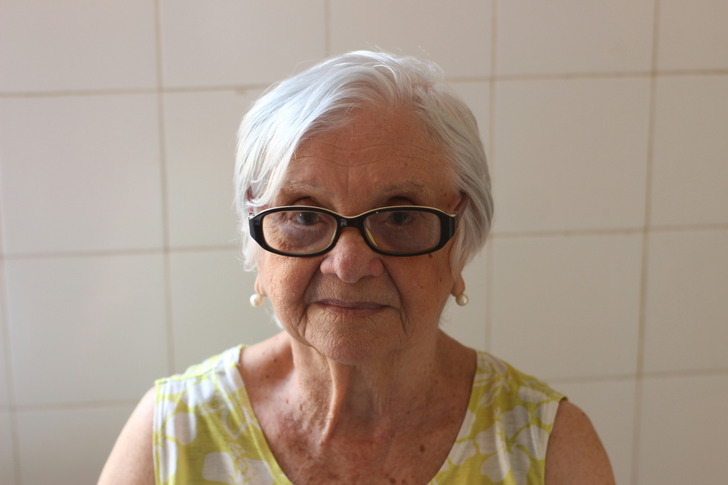With that title I thought the kids were fuckin dead. Maybe be a teensy bit less dramatic.
My DIL Cut Me Off From My Grandkids —Until I Found Out What She Was Hiding
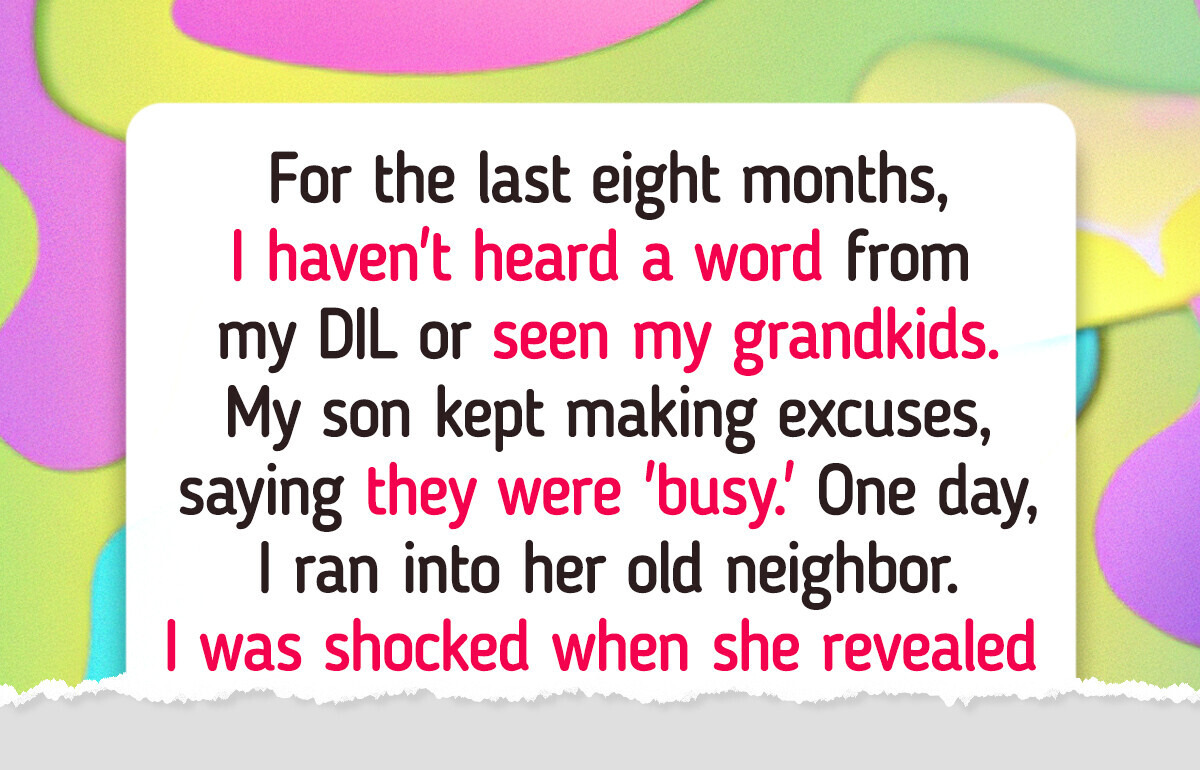
A grandmother was cut off from her son’s family for 8 months without explanation: no calls, no visits, no birthdays. When she finally uncovered the painful truth behind the silence, her world shattered. Here’s her story of betrayal, heartbreak, and feeling pushed out of the family she loved.
What Anoush told us.
Hi Bright Side,
For eight long months, I didn’t hear a word from my daughter-in-law or see my grandkids. No birthday wishes, no phone calls, no visits—just silence. My son kept giving excuses, saying they were “busy” or that “the kids had school,” but deep down, I felt something was wrong.
We used to be so close. I helped care for the kids whenever I could and always thought we were family. I cried many nights, wondering what I had done to deserve this distance. I even left little gifts on their porch, hoping to melt the ice, but nothing worked.
Then one day, I ran into an old neighbor of my daughter-in-law at the grocery store. We started talking, and she casually mentioned seeing a strange man coming and going from my son’s house while he was away for work. My heart sank. After some quiet digging, everything clicked into place.
My daughter-in-law had been hiding an affair. She was terrified I’d find out and tell my son, so she shut me out completely. I was shocked—not just by the betrayal, but by how quickly I went from family to threat.
— Anoush
Remember that your feelings of hurt and confusion are valid, but this situation is not your fault.
- It’s incredibly painful to be cut off from your loved ones, especially when you’ve invested so much love and care. Try not to blame yourself for the actions of others. People’s choices and mistakes often have little to do with the support or love you’ve shown.
Take time to acknowledge your emotions (whether sadness, anger, or disappointment) and give yourself space to grieve what you’ve lost. Healing begins with accepting your feelings without guilt.
When you’re ready, consider approaching your son with openness and compassion, focusing on concern rather than confrontation.
- Your son may not even be aware of the full extent of what’s happening, or he might be in a difficult position himself. Instead of accusing or blaming, try to express your feelings honestly, emphasizing how much you care about him and your grandchildren.
For example, you could say, “I’ve felt worried and hurt not seeing you all for so long. I want to understand what’s going on and be there for you.” This gentle approach can open dialogue without putting him on the defensive, making it easier for him to listen and share.
Don’t hesitate to seek outside support to help you navigate this emotionally draining time.
- Talking to trusted friends, joining support groups for grandparents or family members facing similar situations, or even seeing a counselor can provide invaluable relief and perspective. These safe spaces allow you to express your feelings freely, gain advice from others who understand your experience, and learn coping strategies.
Remember, you don’t have to carry this burden alone—connecting with others can restore your strength and hope.
It’s important to set healthy boundaries to protect your own well-being.
- While your heart wants to be deeply involved with your grandchildren, sometimes stepping back temporarily is necessary to maintain your mental and emotional health. This doesn’t mean giving up on the relationship, but rather giving yourself the chance to recharge and avoid being overwhelmed by pain or stress.
Boundaries might include limiting contact with people who cause you distress or dedicating time to activities that bring you joy and peace. By caring for yourself, you become stronger and better able to support your family when the time is right.
Keep the door open for healing and reconciliation, but allow it to happen in its own time.
- Family relationships can be complex and sometimes require patience and understanding to mend. Make it clear that you are ready to rebuild the connection when they are, without pressure or resentment.
Showing forgiveness and openness—even if the other side is not yet ready—can set a powerful example and eventually pave the way for renewed trust. Remember, healing is a process, and your willingness to forgive can bring hope and light to a difficult situation.
Before you go, be sure to check out our next article featuring 13 incredible moments when people faced life’s toughest challenges head-on and confidently said, “I’ve got this.” Their stories are truly inspiring and a reminder of how powerful resilience can be.
Comments
Related Reads
My Hospitalization Showed Me How My Son Really Feels About Me
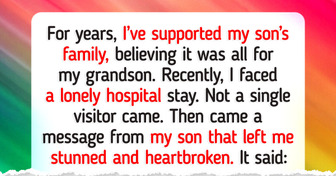
I Refused to Babysit My Brother’s Kids After He Mocked Me in Front of Everyone
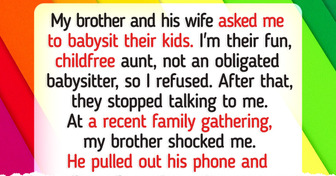
My Son-in-Law Wanted Me to Be His Personal Chef on Holiday—Instead, He Got a Wake-Up Call
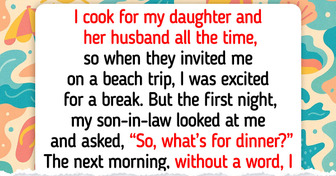
I Asked My Colleague to Wear Deodorant, and Things Blew Up With HR

15 Stories That Prove Some Memories Are Impossible to Delete

12 Life Moments Where Quiet Kindness Played the Main Role

I Refuse to Return to the Office After My Coworker’s ‘Prank’ Revealed His Darkest Secret

12 Moments That Show Romance Is Really About Small Acts of Kindness

My MIL Humiliated Me in Front of Family, So I Exposed Her Secret
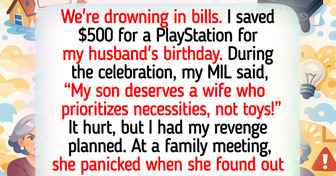
15 Real-Life Moments That Prove Quiet Kindness Is a Real Power Move
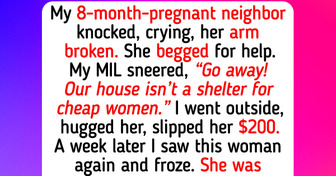
10 Moments of Superhuman Strength That Feel Like Winning the Olympic Games
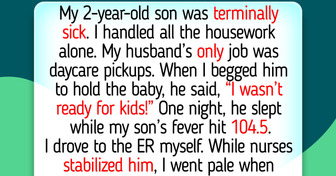
I Refused to Be the Fall Guy After My Boss Called Me "Useless"—I Had Him Reassigned and Took His Clients





